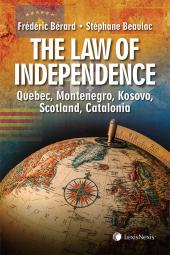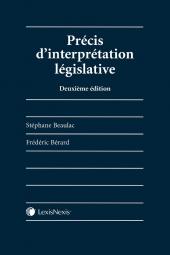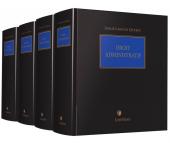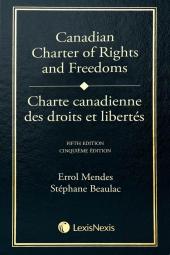The Law of Independence: Quebec, Montenegro, Kosovo, Scotland, Catalonia
One Year Subscription Only Terms
Subscribers receive the product(s) listed on the Order Form and any Updates made available during the annual subscription period. Shipping and handling fees are not included in the annual price.
Subscribers are advised of the number of Updates that were made to the particular publication the prior year. The number of Updates may vary due to developments in the law and other publishing issues, but subscribers may use this as a rough estimate of future shipments. Subscribers may call Customer Support at 800-833-9844 for additional information.
Subscribers may cancel this subscription by: calling Customer Support at 800-833-9844; emailing customer.support@lexisnexis.com; or returning the invoice marked 'CANCEL'.
If subscribers cancel within 30 days after the product is ordered or received and return the product at their expense, then they will receive a full credit of the price for the annual subscription.
If subscribers cancel between 31 and 60 days after the invoice date and return the product at their expense, then they will receive a 5/6th credit of the price for the annual subscription. No credit will be given for cancellations more than 60 days after the invoice date. To receive any credit, subscriber must return all product(s) shipped during the year at their expense within the applicable cancellation period listed above.
Détails des produits
In August 1998, the Supreme Court of Canada handed down one of the most important decisions in recent history: Reference re Secession of Quebec. … The 1998 Reference is most significant because, for the very first time in modern history, a national court considered the tough question of the legal characterization of secession by a federated unit (a province) within a democratic state.
So begins the introduction to this new volume, The Law of Independence, by leading academics and lawyers Frédéric Bérard and Stéphane Beaulac. As they explain, Reference re Secession of Quebec is a landmark judgment regarding the legality, under both Canadian and international law, of a unilateral secession of Quebec from Canada and their text offers a theoretical and pragmatic analysis of the different aspects of the Supreme Court of Canada's decision, including the background and context leading up to the opinion. A comparative study of the nationalist movements and/or referenda in Montenegro, Kosovo, Scotland and Catalonia is also conducted, with a view to shedding light onto the law of independence.
Comprehensive content
The Law of Independence succinctly summarizes and analyzes the seminal 1998 opinion as well as the international influence of the case on other jurisdictions. Written in a clear and easy-to-understand manner, this authoritative text:
- Summarizes the facta filed by the Attorney General of Canada and the amicus curiae in Re Secession, as well as the fundamental aspects of the pleadings of the various intervenors
- Through discussion and analysis of the Court's opinion on the legality of a secession in Canadian law, exposes the misconceptions propagated by the Quebec sovereigntist movement, including the myths that the secessionist question may not be resolved by the courts, the paramountcy of international law over state law in this situation and the right of the province of Quebec to secede unilaterally based on the principle of effectivity
- Examines the aspects of international law discussed in the opinion and the arguments presented by the amicus curiae which were deemed by the Court to lack credibility
- Points out the shortcomings in the analysis of some sovereigntist scholars advocating for a people's right to self-determination
- Demonstrates the small chance of receiving international recognition if Quebec were to make a unilateral attempt at sovereignty, as well as the difficulties associated with taking control of the Quebec territory in a manu militari style
- Offers an international perspective, aided by different case studies of Montenegro, Scotland, Kosovo and Catalonia, to show how foreign public law and, most importantly, international law – together constituting the law of independence – have evolved with regard to questions of secession and a people's right to self-determination
- Further explains how every population that has held a referendum regarding their independence in the past 15 years – including Scotland, Montenegro and Kosovo – were somehow inspired by Canada's past experience
- Illustrates how this Supreme Court of Canada opinion, as well as similar foreign precedents, do not merely represent isolated cases, but are parts of a mosaic of practices and rules which together govern the way in which different territories, within existing states, may become full-fledged sovereign nations
- Beside the two Balkan precedents (Montenegro, Kosovo), covers the two most recent cases involving secession and the people's right to self-determination, the Scottish referendum and the present obstacles faced by Catalonia, and focuses on the many elements of the process of reaching internationally recognized independence
- Contextualizes the relevance of the 1998 opinion which must now be interpreted in light of recent foreign decisions and comments upon these issues while bringing the debate back to Canada and Quebec
- Concludes with a brief comment on the Federal Clarity Bill and Quebec Bill 99
A useful resource
An engaging read, The Law of Independence would be especially valuable to:
- Constitutional lawyers and international lawyers in Canada who must advise their clients and understand the law of independence (self-determination, secession)
- Libraries who want to provide reference materials for constitutional lawyers and students of international law
- Government professionals in Canada including judges, constitutional counsel and advisors on matters of international law
- International readers such as international governments, lawyers, politicians, law professors and policy makers
- All individuals interested in history or political science
Table des matières
Chapter 1: Reference re Secession of Quebec
Chapter 2: The Supreme Court's Answers to the First Question
Chapter 3: The Supreme Court's Answers to the Second Question
Chapter 4: International Perspective
Conclusion
 Lexis Nexis
Lexis Nexis 


